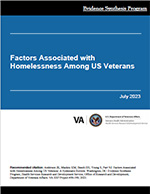
|
Recommended citation: |
Download PDF: Complete Report, Executive Summary, Report, Appendices
Studies conducted among Veterans evaluated individual-level factors associated with homelessness. We did not identify Veteran studies of structural factors examined at the community level, such as housing access and affordability. Adverse childhood experiences (ACEs), discharge status aside from honorable, lower or no service-connected disability rating, history of military sexual trauma, and presence of a mental health and/or substance use disorder were consistently associated with an increased risk of homelessness based on studies with longitudinal evidence.
Homelessness remains more common among Veterans compared to non-Veterans. Circumstances leading to homelessness are often complex, involving both community and individual-level factors. Veterans may have unique individual-level vulnerabilities to homelessness, including those related to combat exposure or military sexual trauma. Improved understanding of the factors that influence Veterans' risk of homelessness, as well as protective factors, is needed to progress towards ending Veteran homelessness.
Individual-level risk factors for homelessness may be best understood as factors that increase a Veteran's vulnerability to structural drivers of homelessness. Adverse childhood experiences, discharge status aside from honorable, lower service-connected disability rating or no service-connected disability rating, history of military sexual trauma, and presence of a mental health condition and/or substance use disorder were consistently associated with an increased risk of experiencing homelessness in studies providing longitudinal evidence, while honorable discharge, higher military pay grade, and having a higher service-connected disability rating were consistently associated with a lower risk. We did not identify any Veteran studies of structural factors examined at the community level, which is an important gap. Future research should aim to integrate community and individual factors to provide a more comprehensive understanding of Veteran homelessness, which if incorporated into a predictive model of homelessness, would likely result in a more accurate assessment of a Veteran's vulnerability to homelessness.